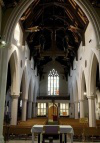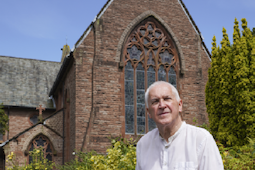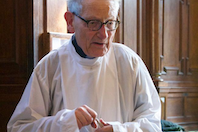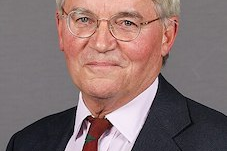Sunday Reflection with Fr Terry Tastard - 31 January 2010

Holy Trinity Church
A certain amount of scepticism in life is a good thing. It allows us to test claims and to sift the true from the false. It prevents us from being deceived and manipulated. But of course, as with everything else, you can have too much of a good thing. You have probably met one or two people whose scepticism is all-pervasive, endless. They question everything and have a distressing tendency towards mockery and scorn. In consequence they find it difficult to trust and cannot see the vulnerability in others.
The scene we find in the synagogue at Nazareth in today's gospel reading (Luke 4.21-30) is an incident where scepticism has overbalanced. Jesus has just explained a passage from scripture in an enlightening way, making it apply to the present. Initially his words are regarded as gracious, but this quickly becomes mockery: 'Who are you to preach to us' they ask. I am always concerned to avoid any antisemitism, and I think that we should be very careful not to see this incident as a confrontation between Jesus and the Jews. After all, it is a very Jewish scene: Jesus meets his fellow Jews in the synagogue. He is with his own people.
When I read this passage it seems to speak to our own times and our own condition. Western culture seems to have become very sceptical, and not just in matters of religion. The media love to set up heroes on pedestals and then knock them down. No one is to be trusted, there is no message that cannot be discredited, there is nothing and no one that we can believe in. All this can of course become a self-fulfilling prophecy, with society increasingly moving from scepticism to cynicism. For example look at v 23, which tells us that those who listened to Jesus were well aware of the miracles he had worked at Capernaum (see Mark 2.1-12). But their challenge to him is essentially scornful, making it virtually impossible for him to bring the same healing to their midst.
I hear resonances with our own age and its people. If you believe that God will not be able to do anything for you, then indeed, God will not be able to do anything for you, because no matter what God does, it will not be recognised or accepted. Where there is radical scepticism, there can be no hope. People cannot trust, and society becomes fearful. Cynicism makes people hard and closes them in on themselves. Against this there is the simple message of Jesus: join me in the kingdom, where the hungry are fed, the naked are clothed and no one is without a friend, where we rejoice in God's love and seek to emulate his mercy. The trigger for the anger in the gospel today comes when Jesus hints that there are others beyond the historic people of God with whom he can work. So, too, one of the most remarkable facts about Christianity in our times is the way it flourishes in Africa, Asia and Latin America, while in its historical heartlands it struggles.
Fr Terry Tastard is parish priest (pastor) of Holy Trinity, Brook Green, in the Hammersmith area of London. His new book: Ronald Knox and English Catholicism is published by Gracewing at £12.99 and is available on Amazon, from religious booksellers and from the publisher.





















